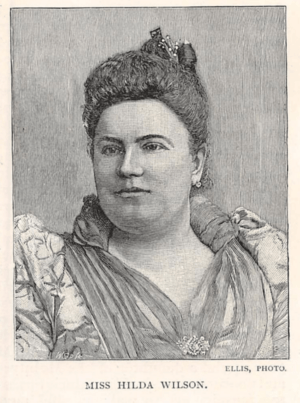Hilda Wilson facts for kids
Hilda Wilson (born April 7, 1860 – died December 10, 1918) was a talented British singer, known as a contralto. She was also a composer. Sometimes she used the name Matilda Ellen Wilson, and when she composed music, she used the name Douglas Hope.
Contents
Life
Hilda Wilson grew up in a musical family in Monmouth, England. Her father, James Wilson, led the local band. Many of her brothers and sisters also became musicians. Her sister Agnes was a professional contralto singer, just like Hilda. Her brother James taught music, and another brother, Henry Lane Wilson, was a pianist and composer.
When Hilda was four, her family moved to Gloucester. She started singing solos at a very young age. At 15, she sang in a famous piece called Messiah. The next year, a newspaper called The Western Mail praised her singing. They said she had a good voice and a great style, even though she was still young.
Hilda had an amazing vocal range when she was young. She could sing parts usually sung by mezzo-sopranos and sopranos. But she eventually chose to focus on being a contralto.
In 1879, Hilda went to the Royal Academy of Music (RAM) in London. This is a very famous music school. She won many awards there, including gold, silver, and bronze medals. Later, she became a Fellow of the RAM, which is a special honor.
During the 1880s and 1890s, Hilda often sang as a soloist at the Three Choirs Festivals. These were big music events. She performed in well-known pieces like Messiah and Mendelssohn's Elijah. She also sang in newer works, including Dvořák's Stabat Mater. She performed at many other music festivals across Britain. In 1891, she was part of the very first performance of Dvořák's Requiem at the Birmingham festival. The famous composer Edward Elgar even wrote some songs for her in 1890.
In London, Hilda often sang with groups like the Bach Choir and the Royal Choral Society. In 1892, she was the main contralto singer in a performance of Messiah at Westminster Abbey. She sometimes performed with her brother Lane. In 1900, after one of their concerts, The Times newspaper said she sang Dvořák's "The Lord is my Shepherd" beautifully.
Hilda also performed at the Henry Wood Promenade Concerts in 1896. Her own song, "Wheresoe'er You Are," was first performed at the famous Last Night of the Proms in 1900. After she stopped performing in concerts, she focused on teaching music. She became the president of the West London Conservatoire of Music, a school started by her family.
Hilda Wilson married Ashley Hart in 1904. She passed away in Boscombe, England, on December 10, 1918, when she was 58 years old.
Compositions
Hilda Wilson wrote several musical pieces. She composed under the name Douglas Hope.
Musical theatre
- Nymphs and Shepherds (This was a "song play" that included poems by Frederick Keel.)
Vocal
- "From Overseas"
- "My Roses"
- "When Birds Do Sing"
- "Wheresoe'er You Are"
 | Janet Taylor Pickett |
 | Synthia Saint James |
 | Howardena Pindell |
 | Faith Ringgold |


